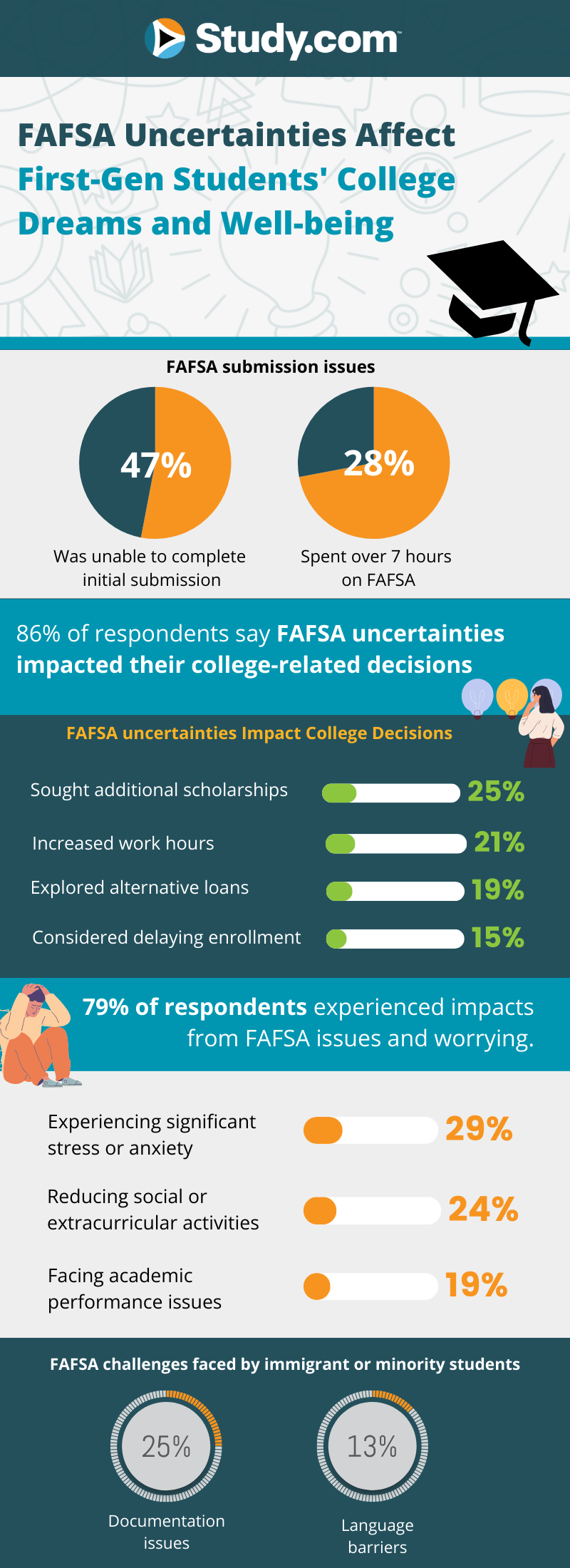
FAFSA complications impact college-related decisions for 79% of first-gen applicants
This story was produced by Study.com and reviewed and distributed by Stacker Media.
FAFSA complications impact college-related decisions for 79% of first-gen applicants
As the FAFSA (Free Application for Federal Student Aid) application deadline approaches on June 30, many students are anxiously waiting to hear if they qualify for federal loans and grants that will make attending college a realistic proposition. However, 2024 has seen a significant decline in completed applications due to technical complications with the updated application process.
The Better FAFSA opened with several issues this year. Among them, students who did not have a Social Security number or whose parents did not have a Social Security number were unable to complete the FAFSA.
These are just a few of the issues that led to a 27% drop in FAFSA submissions and a 40% drop in FAFSA completions as of March 29, 2024, compared to March 29, 2023. This means that, of the significantly fewer people who submitted the FAFSA, even fewer submitted a complete one.
A survey conducted by Study.com found that these complications have slowed or otherwise completely halted the college plans of students nationwide. FAFSA delays have affected 79% of first-gen applicants.
Methodology
The survey was conducted online across the United States from April 19, 2024, to April 20, 2024, by Pollfish on behalf of Study.com. This targeted survey involved 600 first-generation college students, gathering data on their experiences with the FAFSA process. 54% of respondents identified as an immigrant or a person with a minority background, 23% came from low-income households, and 15% were from single-parent households. This survey provides valuable insights into the challenges first-generation students face in securing financial aid for higher education. Additional data comes from Inside Higher Ed, Federal Student Aid, and EdNC.

Declining Trust in Federal Aid
Students, families, teachers, and administrators have had their trust in Federal Aid and the Education department tested this year. Due to the issues with this cycle's FAFSA, colleges have had to push their aid deadlines out – only now sending financial aid awards when they typically do so in January - causing uncertainty for both colleges and students. Colleges don't know which students they will reward financial aid to, so students don't know if they'll receive any financial aid, so they may choose not to enroll in college, so colleges have fewer enrollees. This is all happening while college applications among high school seniors are already down. "The FAFSA submission and completion rate is down, significantly, for high school seniors compared to last academic year. I fear that enrollment in higher education will continue to decline nationally and the trust that FA professionals once had with ED will waver," said City University of Seattle's Director of Student Financial Services, Ashly Eyler.
The FAFSA Poses Unique Challenges for First-generation Students
First-generation students already face challenges that others don't, irrespective of the additional issues brought on by this year's FAFSA opening. For example, 25% of first-generation students experienced documentation issues that prevented them from submitting a complete FAFSA. Additionally, 13% of first-generation students faced language barriers. The FAFSA is available in both English and Spanish. Students whose primary language is different must request an interpreter. As Rev. Juan Gonzales, Hispanic Student Specialist at Asbury University puts it, "We have many conversations with first-generation students, attending college for the first time or who immigrated to the U.S. recently, and their families, regarding the benefits of college education. They have never completed a FAFSA in their life, nor are aware of what or how to do it."
Fewer First-generation Students Completed and Submitted the FAFSA
In addition to the issues above, the opening of the 2024-25 FAFSA introduced new challenges to first-generation students. Students who did not, or whose parents did not, have a Social Security number at the time of application were unable to submit a complete application, dashing their prospects of receiving financial aid. As a temporary fix, the Federal Student Aid (FSA) office instructed students to submit an incomplete FAFSA to be corrected at a later, unspecified date. While this temporary solution has provided some relief, technical issues persist.
Even with this temporary fix, 28% of the students who completed the Study.com survey reported that they spent over seven hours on the FAFSA. For context, the FSA office claims that "it takes most people less than one hour to fill out the FAFSA form, including gathering any personal documents and financial information needed to complete it."
Additionally, 47% of students were unable to complete the initial submission, meaning that the extra time invested in the FAFSA proved fruitless for a significant number of students.
These setbacks have affected the mental-emotional status of students, with 79% of respondents experiencing impacts from FAFSA issues and worrying. 29% of respondents are experiencing significant stress or anxiety, 24% have had to reduce their social or extracurricular activities, and 19% have noticed these issues impacting their academic performance.
The consequences aren't limited to the mental-emotional state of students - it's also affecting their futures. 86% of the students who completed the Study.com survey reported that the uncertainty regarding whether they would receive financial aid and when impacted their college-related decisions. For example, 25% of respondents have done extra work to seek out additional, different scholarships. 19% have explored alternative loans as an option, while 21% have increased their work hours, and 15% are seriously considering or have decided to delay their enrollment so they could work to save money for school.



